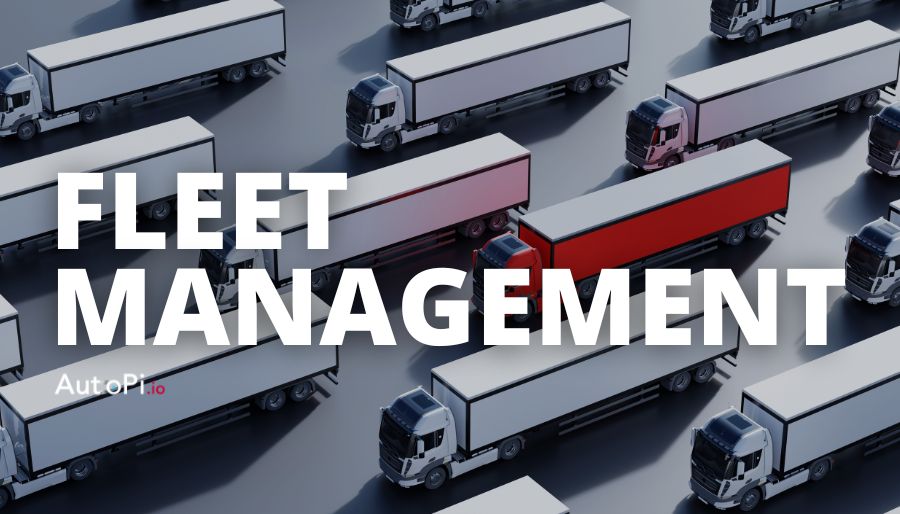Fleet management has evolved into a critical component for businesses of all sizes. As companies strive to control costs, enhance operational efficiency, and ensure safety, effective fleet management is no longer just an option—it’s a necessity. From small delivery services to large multinational corporations, managing a fleet efficiently can be the difference between operational success and costly inefficiencies.
In today’s fast-paced market, businesses must navigate challenges such as rising fuel costs, driver safety concerns, and the complexities of vehicle maintenance. Leveraging advanced technologies and data-driven strategies, modern fleet management transforms how companies monitor and optimize their operations. This guide will walk you through every aspect of fleet management, offering actionable insights and best practices to help you achieve operational excellence.
At RMC Service, we understand that every minute counts and that efficient fleet management can lead to significant cost savings and enhanced productivity. Read on to explore the evolution of fleet management, its key components, benefits, and the emerging trends shaping the future of this dynamic industry.
The Evolution of Fleet Management
Fleet management has come a long way from the days when companies relied solely on manual record-keeping and basic scheduling. In the past, managing a fleet meant maintaining paper logs, conducting manual inspections, and coordinating drivers without any centralized system. This often led to inefficiencies, increased costs, and a higher likelihood of human error.
Today, advancements in technology have revolutionized fleet management. Modern solutions incorporate telematics, real-time data analytics, and integrated software platforms that provide managers with a comprehensive view of their fleet operations. These innovations have paved the way for proactive maintenance, route optimization, and improved driver performance.
With the advent of IoT (Internet of Things) and mobile connectivity, fleet managers can now access real-time information from anywhere. This shift has transformed fleet management from a reactive process into a dynamic and predictive system that not only tracks current operations but also anticipates future needs. As businesses continue to embrace digital transformation, the role of advanced fleet management is set to become even more critical in driving efficiency and reducing costs.
Key Components of Effective Fleet Management
A successful fleet management strategy is built upon several essential components. Each element plays a vital role in ensuring that a fleet operates smoothly and efficiently, while also contributing to overall cost savings.
Telematics and GPS Tracking
Telematics systems are the backbone of modern fleet management. They provide real-time data on vehicle location, speed, and performance, allowing managers to monitor every aspect of their operations. GPS tracking enables route optimization, reduces fuel consumption, and enhances driver safety by identifying areas for improvement.
Advanced telematics systems offer more than just location tracking—they also deliver valuable insights into driver behavior, such as acceleration patterns and braking habits. This data can be used to design targeted training programs that improve overall driving performance and reduce the risk of accidents.
Maintenance Management
Regular vehicle maintenance is crucial for keeping fleets running smoothly. Preventative maintenance programs help reduce unexpected breakdowns and extend the lifespan of your vehicles. Modern fleet management systems integrate maintenance schedules with real-time data, ensuring that service appointments are never missed.
By tracking vehicle performance and maintenance history, fleet managers can predict when a vehicle might require service and plan accordingly. This proactive approach not only minimizes downtime but also helps avoid costly repairs down the line.
Fuel Management
Fuel expenses represent a significant portion of fleet operating costs. Effective fuel management strategies are essential for controlling these costs and ensuring that resources are used efficiently. With advanced fleet management software, managers can track fuel consumption, identify inefficiencies, and implement measures to reduce wastage.
Many modern systems offer detailed fuel reports and even integrate with fuel cards, allowing for a seamless payment process and real-time expense tracking. By analyzing fuel usage patterns, businesses can negotiate better rates, optimize routes, and ultimately achieve substantial cost savings.
Driver Management and Safety
Drivers are the lifeblood of any fleet operation, and their performance directly impacts overall efficiency and safety. Comprehensive fleet management solutions provide tools to monitor driver behavior, from speed monitoring to adherence to scheduled routes. By collecting and analyzing this data, managers can identify areas where drivers may need additional training or support.
Enhancing driver safety not only reduces the risk of accidents but also leads to lower insurance premiums and fewer vehicle repair costs. Furthermore, a focus on driver satisfaction and safety can lead to improved employee retention and a more motivated workforce.
Integrated Fleet Management Software
At the heart of modern fleet management is the software that ties all these components together. Integrated fleet management platforms offer a centralized dashboard where managers can monitor vehicle performance, track maintenance schedules, oversee fuel consumption, and evaluate driver behavior—all in real time.
These systems are designed to be user-friendly, scalable, and capable of integrating with other business systems, such as accounting and HR. By consolidating data into one accessible location, businesses can make informed decisions quickly and respond proactively to operational challenges.
The Benefits of Modern Fleet Management
Implementing a robust fleet management system can deliver a wide array of benefits that go beyond simple cost savings. Here, we explore some of the key advantages that modern fleet management offers to businesses.
Cost Reduction and Efficiency
One of the most immediate benefits of effective fleet management is the reduction in operational costs. By optimizing routes, managing fuel usage, and reducing vehicle downtime through proactive maintenance, businesses can significantly lower their overall expenses. Real-time tracking and data analytics ensure that every resource is used efficiently, leading to improved profitability.
For instance, by utilizing telematics to optimize routes, companies can reduce fuel consumption and minimize the wear and tear on their vehicles. This not only saves money on fuel costs but also extends the lifespan of the fleet, resulting in long-term savings on maintenance and replacement costs.
Enhanced Operational Control
Modern fleet management systems provide unparalleled control over every aspect of fleet operations. With real-time data at their fingertips, managers can quickly identify inefficiencies, adjust routes, and ensure that vehicles are being used to their fullest potential. This level of control translates into smoother operations and a more agile response to changing market conditions.
Integrated dashboards and automated reporting tools make it easier for managers to monitor performance metrics and identify trends that can inform strategic decision-making. This centralized approach to fleet management fosters a culture of continuous improvement, where every facet of the operation is optimized for peak performance.
Improved Safety and Compliance
Safety is a paramount concern in fleet operations. Modern fleet management tools help mitigate risks by providing comprehensive insights into driver behavior and vehicle performance. With features like real-time alerts, accident reporting, and driver performance analysis, companies can create a safer working environment and reduce the likelihood of costly accidents.
In addition to enhancing safety, advanced fleet management systems also help businesses maintain compliance with local and international regulations. Detailed logs and audit trails ensure that all operations adhere to required standards, protecting the company from potential legal issues and fines.
Increased Customer Satisfaction
Efficient fleet management directly impacts customer satisfaction. By ensuring timely deliveries and maintaining high levels of service reliability, companies can build a strong reputation for dependability. Real-time tracking not only improves internal operations but also enables businesses to provide accurate delivery updates to customers, enhancing overall service quality.
Moreover, a well-managed fleet contributes to a positive brand image. Customers are more likely to trust a company that demonstrates professionalism, reliability, and a commitment to safety—all of which are hallmarks of effective fleet management.
Implementing Fleet Management Strategies
Transitioning to a modern fleet management system requires careful planning and execution. Here are some key strategies to consider when implementing new fleet management solutions.
Conducting a Comprehensive Fleet Audit
Before making any changes, it’s essential to conduct a thorough audit of your current fleet operations. This process should include an evaluation of vehicle performance, fuel usage, maintenance records, and driver behavior. By understanding your current baseline, you can identify areas for improvement and set measurable goals for your new system.
A comprehensive audit not only highlights inefficiencies but also provides valuable insights that can inform the selection of appropriate technologies and software solutions. This data-driven approach ensures that any changes are aligned with your business objectives and operational needs.
Selecting the Right Technology
The market for fleet management solutions is diverse, with numerous software platforms and telematics providers available. When selecting the right technology, consider factors such as ease of integration, scalability, and user-friendliness. It’s important to choose solutions that can grow with your business and adapt to evolving operational requirements.
Look for platforms that offer robust reporting, real-time data analytics, and seamless integration with other business systems. Additionally, consider the level of customer support and training provided by the vendor, as these services can play a critical role in the successful implementation of your fleet management strategy.
Training and Change Management
Implementing a new fleet management system is not just a technological upgrade—it also requires a shift in company culture and operations. Invest in comprehensive training programs for both drivers and managers to ensure they are comfortable using the new tools. Change management strategies, including regular feedback sessions and performance reviews, can help ease the transition and foster a positive attitude toward new technologies.
Effective training ensures that everyone understands the benefits of the new system and is equipped to use it to its fullest potential. By empowering your team with the necessary skills and knowledge, you can maximize the return on your investment in fleet management technology.
Continuous Monitoring and Improvement
Fleet management is an ongoing process that requires constant monitoring and refinement. Once the new system is in place, establish regular review periods to assess performance against key metrics. Use the data generated by your fleet management software to identify trends, address inefficiencies, and make informed decisions about future improvements.
A commitment to continuous improvement ensures that your fleet remains agile and responsive to changing market conditions. By regularly analyzing performance data and soliciting feedback from drivers and managers, you can adapt your strategies to maintain optimal operational efficiency.
The Role of Fleet Management Software Solutions
Software solutions have become the cornerstone of modern fleet management. These systems not only consolidate data from multiple sources but also provide actionable insights that drive smarter decision-making. Here, we delve into how fleet management software solutions are transforming the industry.
Centralized Data Management
One of the key benefits of integrated fleet management software is the ability to centralize all operational data into a single, easy-to-use platform. This consolidation allows managers to view everything from fuel consumption and maintenance schedules to driver performance metrics in one place. With a centralized system, the time-consuming task of manual data entry is eliminated, reducing errors and streamlining processes.
Centralized data management also facilitates real-time monitoring. Managers can access up-to-date information on vehicle locations, operational status, and compliance with maintenance schedules. This real-time visibility not only improves operational control but also enhances decision-making by providing a holistic view of the fleet’s performance.
Integration with Other Business Systems
Modern fleet management software is designed to integrate seamlessly with other critical business systems, such as accounting, HR, and customer relationship management (CRM) platforms. This interoperability ensures that fleet data is consistently updated across all departments, reducing redundancies and enhancing overall operational efficiency.
For example, integrating fleet management software with accounting systems can simplify the reconciliation process by automatically syncing fuel expenses, maintenance costs, and other expenditures. This integration not only saves time but also improves financial accuracy and transparency.
Scalability and Customization
As businesses grow, their fleet management needs evolve. Scalable software solutions offer the flexibility to add new vehicles, drivers, and operational parameters without disrupting existing processes. Customizable dashboards and reporting tools allow managers to tailor the software to their unique requirements, ensuring that the system remains relevant as business needs change.
Customization is particularly important for companies with diverse fleets. Whether managing a small number of vehicles or an extensive network, scalable software solutions can accommodate a wide range of operational demands, making them an essential tool for sustainable growth.
Challenges in Fleet Management and How to Overcome Them
While modern fleet management offers numerous benefits, it also presents several challenges. Understanding these hurdles and implementing strategies to overcome them is key to long-term success.
Managing Rising Operational Costs
One of the primary challenges faced by fleet managers is the increasing cost of operations, particularly with rising fuel prices and maintenance expenses. To combat these challenges, businesses must adopt cost-saving measures such as route optimization, predictive maintenance, and fuel management strategies. By leveraging data analytics and real-time monitoring, companies can identify inefficiencies and implement targeted improvements that lead to significant cost reductions.
Ensuring Driver Compliance and Safety
Driver behavior plays a critical role in fleet performance and safety. Maintaining consistent standards across a diverse team can be difficult, especially in large organizations. Implementing comprehensive driver training programs, along with real-time monitoring tools, can help ensure that drivers adhere to company policies and industry best practices. Additionally, providing regular feedback and incentives for safe driving can foster a culture of accountability and continuous improvement.
Integrating Legacy Systems with New Technology
Transitioning from outdated legacy systems to modern fleet management solutions can be a complex process. Many businesses face compatibility issues and resistance to change when integrating new technologies into existing operations. To ease this transition, it’s important to choose scalable solutions that offer robust integration capabilities and to invest in training and change management initiatives that encourage staff to embrace new systems.
Data Overload and Analysis
With the abundance of data generated by modern fleet management systems, extracting actionable insights can sometimes be overwhelming. Companies must invest in analytics tools that not only capture data but also present it in a clear, understandable format. Automated reporting and customized dashboards can simplify the process, enabling managers to focus on critical metrics and make informed decisions without being bogged down by excessive data.
Future Trends in Fleet Management
The landscape of fleet management continues to evolve, driven by rapid advancements in technology and changing market demands. Several key trends are poised to shape the future of fleet management in the coming years.
Autonomous Vehicles and AI Integration
As autonomous vehicle technology matures, fleet management will increasingly incorporate AI-driven systems to optimize routes, predict maintenance needs, and enhance safety protocols. Autonomous vehicles promise to reduce human error and improve overall efficiency, while AI analytics will offer deeper insights into operational performance.
Internet of Things (IoT) and Real-Time Connectivity
The integration of IoT devices in fleet management is set to revolutionize how data is collected and analyzed. From engine performance sensors to real-time fuel monitoring, IoT technology will provide an unprecedented level of connectivity and insight. This real-time data will enable fleet managers to make proactive decisions and respond swiftly to any operational issues.
Sustainability and Eco-Friendly Practices
Environmental concerns and stricter emissions regulations are driving the need for sustainable fleet management practices. Companies are increasingly investing in alternative fuel vehicles, electric fleets, and eco-friendly routing solutions. As sustainability becomes a priority, fleet management strategies will need to balance operational efficiency with environmental impact.
Enhanced Security Measures
With the growing sophistication of cyber threats, security remains a top concern for fleet management systems. Future solutions will incorporate advanced encryption, biometric verification, and blockchain technology to ensure the integrity and safety of all fleet data and transactions. As security measures evolve, companies can expect greater protection against unauthorized access and fraud.
Real-World Success Stories
The transformative power of modern fleet management is best illustrated by real-world examples. Here are a few case studies that highlight how businesses have successfully leveraged fleet management strategies to achieve significant improvements.
Case Study 1: Regional Logistics Provider
A regional logistics company with a fleet of over 50 vehicles implemented a comprehensive fleet management system to optimize its operations. By integrating telematics, real-time fuel monitoring, and predictive maintenance, the company reduced its overall fuel costs by 12% and decreased vehicle downtime by 20%. The system’s real-time alerts and detailed reporting allowed managers to quickly identify inefficiencies and implement corrective measures, leading to enhanced safety and improved driver performance.
Case Study 2: National Delivery Service
A national delivery service operating in multiple cities faced challenges with route optimization and driver compliance. By adopting an integrated fleet management platform, the company was able to consolidate all operational data into a single dashboard. This enabled real-time tracking of delivery vehicles, improved route planning, and a marked reduction in fuel wastage. The company reported a 15% improvement in on-time deliveries and a significant boost in overall operational efficiency.
Tips for Maximizing Your Fleet Management Strategy
To fully realize the benefits of modern fleet management, businesses should consider implementing the following best practices:
- Invest in Comprehensive Training:
Ensure that both drivers and managers are well-versed in the new technology. Regular training sessions can help in understanding the system’s capabilities and encourage adherence to company policies. - Leverage Data Analytics:
Use the insights provided by fleet management software to monitor key performance indicators and identify trends. This data can drive continuous improvements in route optimization, fuel usage, and maintenance scheduling. - Embrace Change Management:
Transitioning to modern fleet management systems may be challenging. Invest in change management strategies to help employees adapt, and maintain open lines of communication throughout the process. - Regularly Review and Update Policies:
As market conditions and technology evolve, periodically review your fleet management policies. Update procedures to ensure they remain aligned with industry best practices and regulatory requirements. - Focus on Sustainability:
With environmental concerns on the rise, incorporate sustainable practices into your fleet management strategy. Consider alternative fuel options and eco-friendly routing to reduce your carbon footprint while optimizing costs.
Conclusion
Effective fleet management is the cornerstone of operational excellence in today’s competitive business landscape. By leveraging advanced technologies, embracing data-driven strategies, and implementing best practices, businesses can significantly reduce costs, improve safety, and boost overall productivity.
At RMC Service, we are committed to helping businesses harness the power of modern fleet management. Our tailored solutions are designed to meet the unique needs of your fleet, ensuring that you stay ahead of the curve in an ever-evolving market. Whether you are looking to optimize fuel consumption, enhance driver safety, or streamline your entire operation, our expertise and innovative technology can drive your success.
Are you ready to revolutionize your fleet management strategy? Contact us today and discover how our comprehensive solutions can transform your operations, reduce your expenses, and pave the way for sustainable growth.














